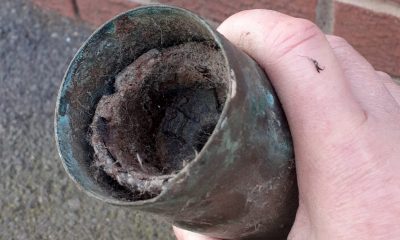Study explores if COVID-19 vaccine can help treat cancer
Published
2 years ago onBy
Talker News
By Mark Waghorn via SWNS
A COVID-19 vaccine could help treat cancer, according to new research.
The jab boosted immune cells in 93 percent of patients with different forms of the disease - including leukaemia and solid lymphomas.
Named, CoVac-1, it was developed by German scientists to fuel T-cells - white blood cells that destroy invaders.
It is unlike traditional vaccines which directly target specific pathogens within the body.
This secondary response is vital for those with suppressed immune systems.
Now it has been found to be remarkably effective in fighting cancer.
Senior author Professor Juliane Walz, of University Hospital Tubingen, said: "To our knowledge, CoVac-1 is currently the only peptide-based vaccine candidate specifically developed and evaluated for immuno-compromised patients."
Approved vaccines induce a robust immune response against SARS-CoV-2 - the virus that causes COVID-19 - in most individuals.
But they have been less effective in patients blood cancers as treatments often damage healthy immune cells - in addition to malignant ones.
Prof Walz said: "In the clinic, we see many cancer patients who do not mount sufficient humoral immune responses after vaccination with available SARS-CoV-2 vaccines. These patients are thus at a high risk for a severe course of COVID-19."
Many chemotherapies and some immunotherapies destroy B cells, the immune cells responsible for antibody, or humoral, responses.
COVID-19 vaccines rely heavily on them. One way to compensate is to enhance the response from T cells, another type of immune cell.
Co-author Claudia Tandler, a graduate student in the lab, said: "T-cell immune responses against SARS-CoV-2 are of particular importance for patients with B-cell deficiencies, who develop very limited antibody responses after infection or vaccination.
"T cell-mediated immunity is indispensable for developing protective antiviral responses, and previous evidence has shown that T cells can combat COVID-19 even in the absence of neutralizing antibodies."
Designing a vaccine to stimulate T cells requires the careful selection of SARS-CoV-2 antigens - small pieces of viral proteins that can stimulate immune cells.
Current mRNA-based vaccines produce a larger piece of the spike protein which hooks onto cells - and is broken down into antigens.
Ms Tandler and colleagues chose six specific antigens from different parts of the virus to make up their vaccine.
CoVac-1 is a peptide vaccine, meaning the protein pieces are injected directly, rather than being encoded via mRNA.
Ms Tandler said: "CoVac-1-induced T-cell immunity is far more intense and broader, as it is directed to different viral components than mRNA-based or adenoviral vector-based vaccines that are limited to the spike protein and are thus prone to loss of activity due to viral mutations."
The researchers previously tested the safety and preliminary efficacy of CoVac-1 in individuals without immune deficiency.
They found all those who received the vaccine maintained robust T-cell responses three months afterwards - including against omicron and other variants of concern.
There were minimal side effects. The results provided the foundation for a phase I/II clinical trial testing its efficacy in immunocompromised patients.
In the first 14 patients with a B-cell deficiency, including 12 with leukaemia or lymphoma - were given a single dose of CoVac-1.
They were monitored for up to six months. Notably, 64 percent had previously received an approved COVID-19 vaccine that failed to elicit an immune response.
Two weeks later T-cell immune responses were observed in 71 percent of participants - rising to 93 percent after four weeks.
The potency exceeded spike-specific T-cell responses observed in B cell-deficient patients after vaccination with mRNA vaccines.
T-cell responses from CoVac-1 also exceeded those mounted by individuals who are not immuno-compromised following a COVID-19 infection.
The researchers are currently preparing a phase III clinical trial to evaluate CoVac-1 in a larger population of immuno-compromised individuals.
It is hoped the results will allow the vaccine to protect cancer patients with B-cell deficiencies from severe cases of COVID-19.
Prof Walz added: "CoVac-1 is designed to induce broad and long-lasting SARS-CoV-2 T-cell immunity, even in individuals who have impaired ability to mount sufficient immunity from a currently approved vaccine, and thus protect these high-risk patients from a severe course of COVID-19."
The findings were presented at an American Association for Cancer Research meeting in New Orleans.
Stories and infographics by ‘Talker Research’ are available to download & ready to use. Stories and videos by ‘Talker News’ are managed by SWNS. To license content for editorial or commercial use and to see the full scope of SWNS content, please email [email protected] or submit an inquiry via our contact form.
You may like


Metals can heal themselves just like ‘The Terminator’


Two-faced star has hydrogen on one side and helium on other


World’s oldest big game hunting weapon found


An espresso a day could keep Alzheimer’s at bay


Being bipolar significantly raises risk of premature death: study


Soccer players who regularly use head more likely to develop Alzheimer’s
Other Stories


New breakthrough treatment boosts cancer-fighting cells
The approach involves activating the immune cells in the body and "reprogramming" them to attack and destroy the cancer cells.


One-year-old can’t stop laughing during first ride at Disneyland
"We didn't expect him to love it that much."


Dad running marathon wearing chainmail weighing over 40 pounds
A dad is attempting to break the world record for the fastest marathon while wearing chainmail.


Hero saves elderly couple by dragging them out of burning car
The Good Samaritan jumped into action after spotting the fire on his way to work.


Bomb squad seals off town after ammunition shell donated to charity shop
Staff discovered the device in a bag of donations.
Top Talkers

 Parenting1 day ago
Parenting1 day agoSingle mom details struggles of feeding her 12 kids

 Broadcast3 days ago
Broadcast3 days agoOver 40% of Americans have no clue what a 401k is

 Broadcast2 days ago
Broadcast2 days agoHow hard is it for Americans to live sustainably?

 Broadcast1 week ago
Broadcast1 week agoGrocery shopping hungry is costing Americans this much

 Funny1 week ago
Funny1 week agoCops confused by crow mimicking police siren

 Shopping1 week ago
Shopping1 week agoGrocery shopping hungry costs Americans this much every trip

 Money3 days ago
Money3 days agoOver 40% of Americans have no clue what a 401k is

 Parenting1 week ago
Parenting1 week agoIt takes this many minutes for the average American kid to get bored
